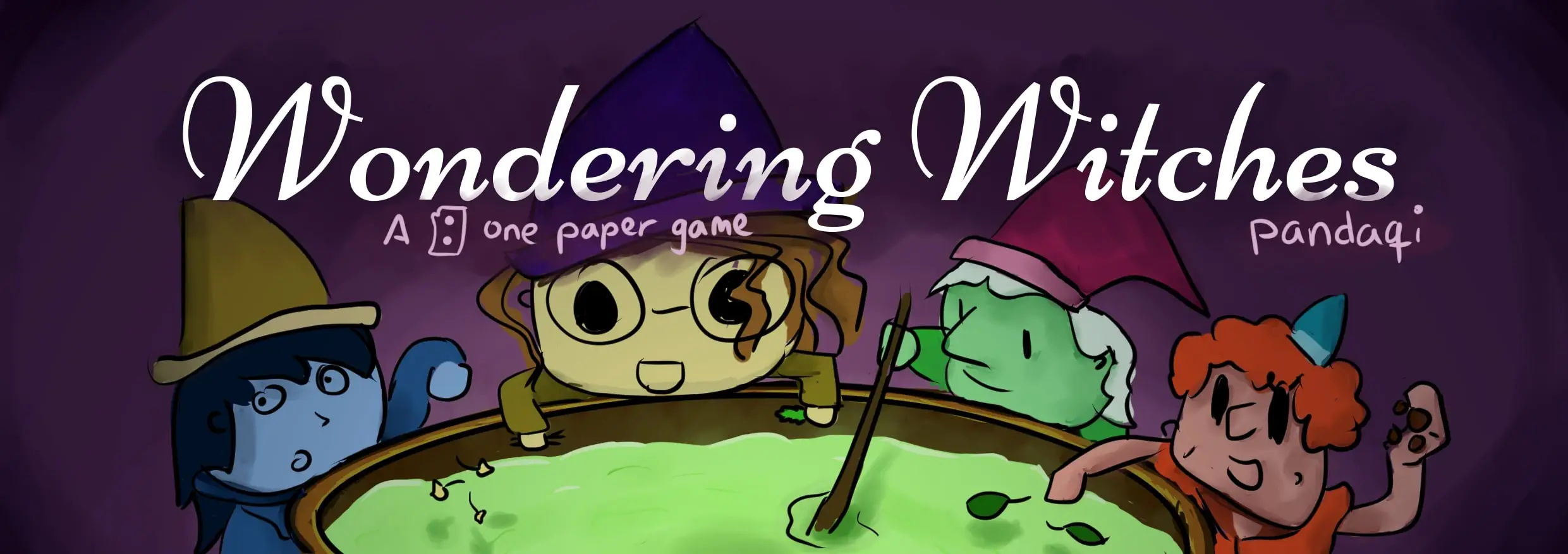
Wondering Witches (Part 2)
Welcome to part 2 of my Technical Devlog for the game Wondering Witches!
Haven’t read the other entries? Go to the devlog overview.
Generating Random Puzzles
Now comes the hard part.
Generating a completely random puzzle is easy enough. Just create a list of all the numbers 1-N, then hand them out to random ingredients. The ingredients that do not receive a number are fake/decoys.
Then do the same for any special effects, and you’re done! Ta da! A random recipe!
Checking “solvability”
However … there’s a chance such a recipe becomes unsolvable.
Any recipe of more than 6 ingredients is too long. (It’s way too hard and there’s not enough space on the board.)
Some effects may change the numbers or order in the potion, which may cause the puzzle to be unsolvable.
How do we solve this conundrum?
The “easy” solution would be to simply not include those nasty effects. Keep the code under 6 ingredients, only use very basic effects, and we’re done.
But that’s boring. So, two solutions remain.
One is where you check recipe solvability on an individual level. For example, after every effect/number you hand out, check if you need to do something to keep the puzzle solvable. (For example: “hey, I just added a Spicy effect, which means we need to lower the number of the ingredient supposed to come after it”)
As you might expect, this is really hard. It requires custom code for many effects and other operations.
The second solution is far better: simply check all possible solutions. One of them is correct? Yes, this puzzle is solvable. None of them work? Throw it out and try a different puzzle.
To do this, we only need a big loop (going over all possibilities) and the potion evaluation function (which I described in detail in the previous section).
Remark: in the end, I used a recursive function for this, simply because I felt like that was the easiest way. It checks if the current combination is at the correct length. If not, it adds a number, then calls itself again.
Heuristics for the win!
If you’ve worked with these kinds of simulations before, you already know what’s coming: but … that’s 10^6 possibilities! Too much! It’s too much!
Unfortunately, JavaScript is not able to create and evaluate a million complex potions within a reasonable amount of time. You don’t even want to try that.
Fortunately, we can use heuristics. We can ask ourselves: what are general characteristics of a good solution? What are some smart rules the solution must follow?
Heuristic #1: Some ingredients or effects cause the computer to “ignore” them. They do not count towards the result, so we can also ignore these during simulation.
Heuristic #2: A solution needs ingredients to be in sequence. Thus, if the last ingredient had number 2, for example, we only need to check ingredients with number 1-3 (or no fixed number).
The second heuristic brings down the search space significantly. It also comes at a cost: a solution could be possible where the sequence isn’t so strictly followed. For example, when an effect lowers the value of an ingredient by a lot, the ingredients with value 2 and 5 could be right next to each other. We would miss those solutions now.
But that’s only a tiny fraction of the possible puzzles. Using the heuristics above, the simulation takes (on average) about 500-1000 evaluations before it knows whether a puzzle is solvable. This happens so fast, you probably don’t even have to wait.
1// THE BIG LOOP! Create puzzle, then check if it is solvable, rinse and repeat until done
2// (this is called at the start of the game)
3puzzleIsValid = false;
4do {
5 createPuzzle(); // => discussed in the previous section of the article
6 checkPuzzle(); // => will discuss now
7} while(!puzzleIsValid);
8
9
10function checkPuzzle() {
11 // Call the recursive function, starting with an empty cauldron/empty combination
12 // (It will automatically check everything and return true/false accordingly)
13 var result = checkCombinationRecursive([]);
14
15 // permanently set whether the puzzle has a solution or not
16 puzzleIsValid = result;
17}
18
19// This is a recursive function that steps through ingredients, checking all possible combinations
20// For each combination, it calls usePotion (or a faster variant of it) and checks the result
21// If the potion was correct, exit the search and return true! Otherwise, it returns false.
22function checkCombinationRecursive(comb) {
23 // if we're at max code length, test the potion
24 if(comb.length >= codeLength) {
25 return usePotion(comb);
26 }
27
28 // otherwise, check all next ingredients
29 // start with the last value (so we can reduce the number of combinations to check)
30 var lastVal = -100;
31 if(comb.length > 0) {
32 lastVal = curPuzzle[ comb[comb.length - 1] ].myNum;
33 }
34
35 for(var i = 0; i < curPuzzle.length; i++) {
36 // ignore elements that are too far apart to be in consecutive order
37 // do NOT ignore "ignore" decoys if they have (at least) one effect
38 if(lastVal != -100 && Math.abs(lastVal - curPuzzle[i].myNum) > 1 && !(curPuzzle[i].myNum == -1 && curPuzzle[i].effects.length > 0)) {
39 continue;
40 }
41
42 // otherwise, the combination [lastVal, curPuzzle[i].myNum] COULD be a valid one, so ...
43 // append new value to combination
44 var newComb = JSON.parse(JSON.stringify(comb));
45 newComb.push(i);
46
47 // check the combination and report the result
48 var result = checkCombinationRecursive(newComb);
49 if(result) {
50 return true;
51 }
52 }
53
54 return false;
55}So, we now have random puzzles, which we know are solvable. We also have a way to test any potion you put into it.
What’s next on the list? An interface for testing and giving the correct feedback to the players. (So, you know, they can actually figure out the puzzle without playing for hours.)